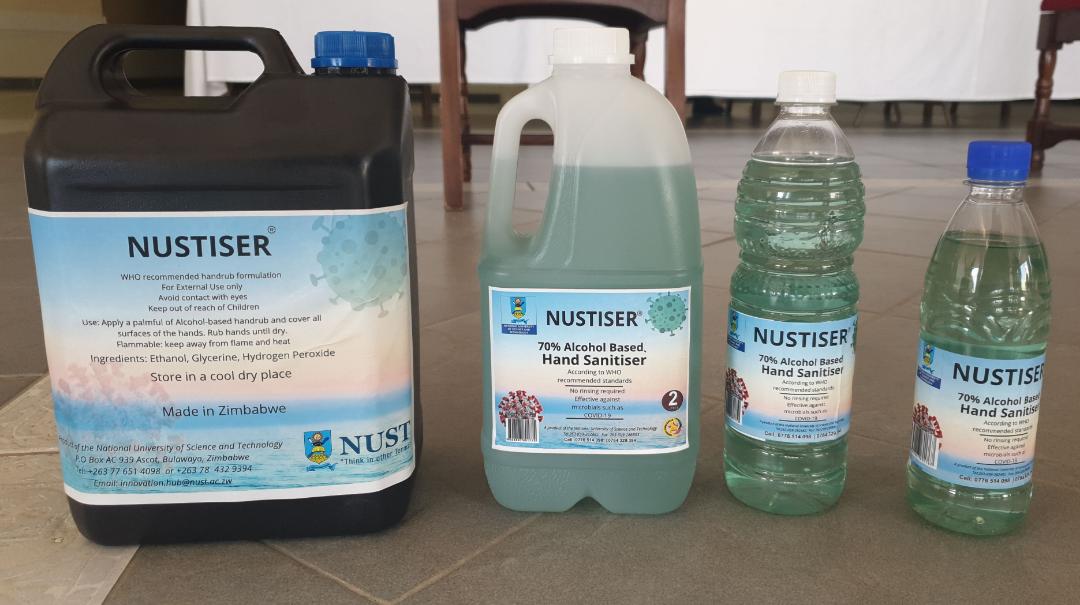The National University of Science and Technology (NUST) has been urged to rethink its business model for increased profitability since the higher learning institution has commercialised its production of hand sanitisers and face masks.
NUST started producing hand sanitisers and masks as part of its contribution in the fight against the COVID-19 pandemic and as a means of generating income for the institution`s infrastructural development.
The institution has since received certification from the Standards Association of Zimbabwe (SAZ) and now supplies its sanitiser to the National Pharmaceutical Company (NatPharm).
Addressing NUST staff, Director of Research, Innovation, Technology and Development in the Ministry of Higher and Tertiary Education, Science, Innovation and Technology Development on Wednesday, Dr Willie Ganda, encouraged the university to improve its business model.
“Now that the science and technology part is good you need to work on the business side in order to be more productive. NUST must create a holding structure company that must run like a business and have interest in all the ventures NUST is going to have during and post-COVID. Underneath that company, we will have investment interests in various companies that would be formed under the ambit of NUST,” he said.
“The arrangements under those companies are very important, as we emphasised that all the funding projects must now be 100 percent owned by NUST. This is very important because in some cases I won’t mention, we handled cases where public funds and projects funded by government saw some institutions having minute shareholding or didn’t have necessarily clear shareholding.”
Dr Ganda, a NUST alumni and president of the student union, also advised the university to ignore criticism and continue with its sanitiser production because there were some who were unhappy with the initiative.
“We have received a lot of criticism, some of it veiled others saying higher education is now delving into things they shouldn’t be doing. They shouldn’t be manufacturing sanitisers and some were querying a lot of things such as quality issues. That’s why sometimes you found your sanitiser was not picked here, up until last week when deputy minister of health came through,” he said.
Dr Ganda claimed there was a lot of mischief in the system because people had been benefitting solely.
“Imagine how angry someone is – they were selling to NatPharm a sanitiser for ZWL$1 600 then they hear NUST is selling for ZWL$578, obviously someone would be very angry.”
He noted the ministry did not want to hear that funds meant to produce sanitisers were abused by other entities.
“Public funds should be used well because COVID funds would be audited,” Dr Ganda said, adding that NUST must not to sell its products at subsidised prices.
“When you started you had very low prices and us as the ministry informed you to change your prices because if you manufacture at low prices middlemen are very smart. They would still manufacture from their factories but buy from NUST, a litre of ethanol and some sanitisers at ZWL$100, which you were charging initially.
“They would then sell at NatPharm for ZWL$1 600 because these are the prices that we are buying sanitisers for. So we want NUST to run a proper business model that will then prove to us whether you are supposed to be teaching commerce or not.”
Dr Ganda added that NUST could allow its staff to hold shareholding for innovations that would come post-COVID but these arrangements had to be clear.
“In order to avoid abuse of public funds and funding private interests,” he said.
Dr Ganda said NUST’s business venture needed clarity and vision for it to succeed.
“A lot of things are happening and one of the reasons why things are expensive in our country is there are people who realised they can just make money without producing anything.
“All they do is buy a phone for $400 but sell it for $5 000 without blinking an eye. So now that you are good on technology, we encourage you to grow on the business side,” he said.

